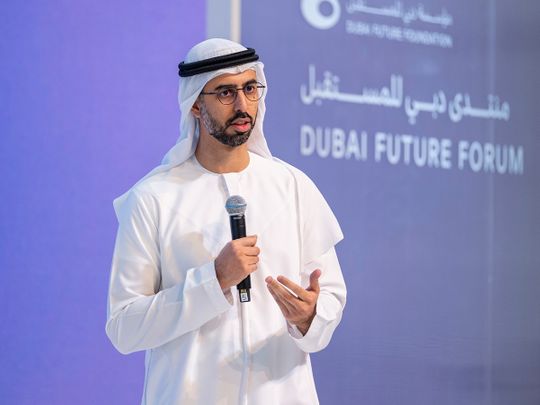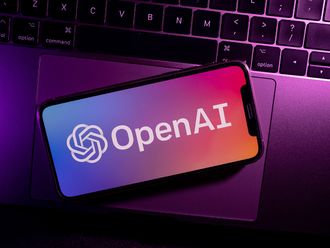
Dubai: One of the critical priorities for governments worldwide is to address deepfakes, according to UAE Minister of State for Artificial Intelligence, Digital Economy, and Remote Work Applications, Omar Sultan Al Olama.
“I think deepfakes need to be addressed because it erodes the people’s trust in the content,” Al Olama said at Gitex 2023 at the Dubai World Trade Centre on Monday. “It’s a big problem, so we must be heavy-handed with deepfakes.”
The minister suggested that governments should also take a firm stance against using tools that create misinformation, as these tools can erode trust in governments. Misinformation, disinformation, and fake news, which frequently focus on topics like politics, health, immigration, and climate change, have become a pervasive concern in recent years.
A global survey revealed that some Gen Z and Millennial news consumers knowingly or unknowingly shared misleading news, posing risks even to savvy audiences.
Read more:
- Gitex 2023: What should come first – cloud or AI? Microsoft’s Naim Yazbeck has his say
- UAE is into reforming ‘geo-economy’ through BRICS presence: Minister Al Marri
- Gitex 2023: Are UAE tech jobs up for another rise in 2024 as AI makes things happen?
- Gitex Global 2023: Self-driving police patrol unveiled in Dubai
In contrast to these challenges, the UAE has witnessed positive outcomes from AI advancements. According to the minister, the country has been receiving positive feedback from the LLMs (Large Language Model). “So if you look at Jais, Falcon and different tools created in the UAE, the quality of improvement it had on people’s knowledge and ability to create new products has been incredible.”
Bringing Arabic to the AI mainstream
Jais, an open-source bilingual Arabic-English large language model (LLM), is a recent addition to the UAE’s AI achievements. Developed by Inception, an Abu Dhabi AI company, G42 unit, Mohammed Bin Zayed University of Artificial Intelligence and Silicon Valley-based Cerebras Systems, Jais is designed to bring the Arabic language into the AI mainstream.
In September, the UAE’s Technology Innovation Institute (TII) launched Falcon 180B, an advanced iteration of its flagship LLM.
Among the best-closed source LLMs, Falcon 180B ranks just behind OpenAI’s latest GPT 4 and is on par with the performance of Google’s PaLM 2 Large, the model powering Bard, according to a statement issued by the company. The licencing framework for the model is established on ‘Falcon 180B TII License’, based on Apache 2.0.
“LLMs became mainstream in the last 18 months. Within 18 months, the UAE has launched Jais, Noor and Falcon alongside multiple other LLMs, whether in Arabic or LLMs that are general purpose,” said Al Olama. “Those today are the most used open-source LLMs on the planet, and the following year will be much more impressive than the past year.
The AI minister said that the perfect scenario for AI regulation would be government-led, private sector-driven, multilateral organisation-endorsed governance.
AI-influenced weapons
On AI weaponry, Al Olama emphasised the importance of realistic considerations, stating that AI-capable technology for weaponry already exists. He underlined the necessity for broader discussions on AI regulations to prevent misuse. “In a perfect world where everyone agrees that we will not do it, we won’t. But in a world where there’s a chance that someone can use it for their advantage, we need to be realistic.”
“But in the realistic view, it already exists. So if you look at for example, the drones that were used in Afghanistan and Iraq and different battle zones, these drones have AI capabilities for targeting, we have AI capabilities for surveillance of other things. These technologies have existed for over two decades. It’s not new. The question that needs to be asked is, should the technology itself be making the decision?”
The minister also said more conversations about AI regulations must be held to prevent this from happening.
Silicon Valley of the Middle East
When asked if the UAE is working on becoming the Silicon Valley of the Middle East, the minister pointed out that the combined areas of Dubai and Abu Dhabi provide ample space to attract a diverse range of global talent, setting the stage for the UAE to establish its unique model and become a benchmark for technological innovation.
He said, “Silicon Valley is 1,874 square miles of pure proper talent, now if you think about it this way. Between Dubai and Abu Dhabi, you have at least 5x that space. If we can attract that talent quality within our area, we will create our model. And that model is hopefully going to be the benchmark.”




